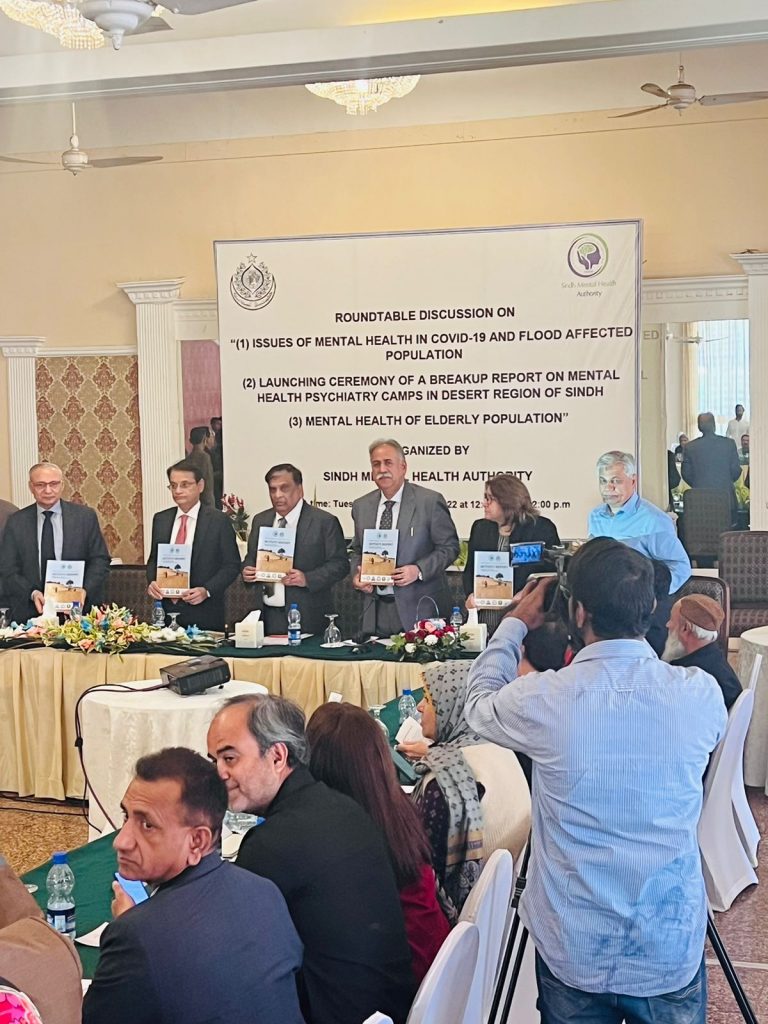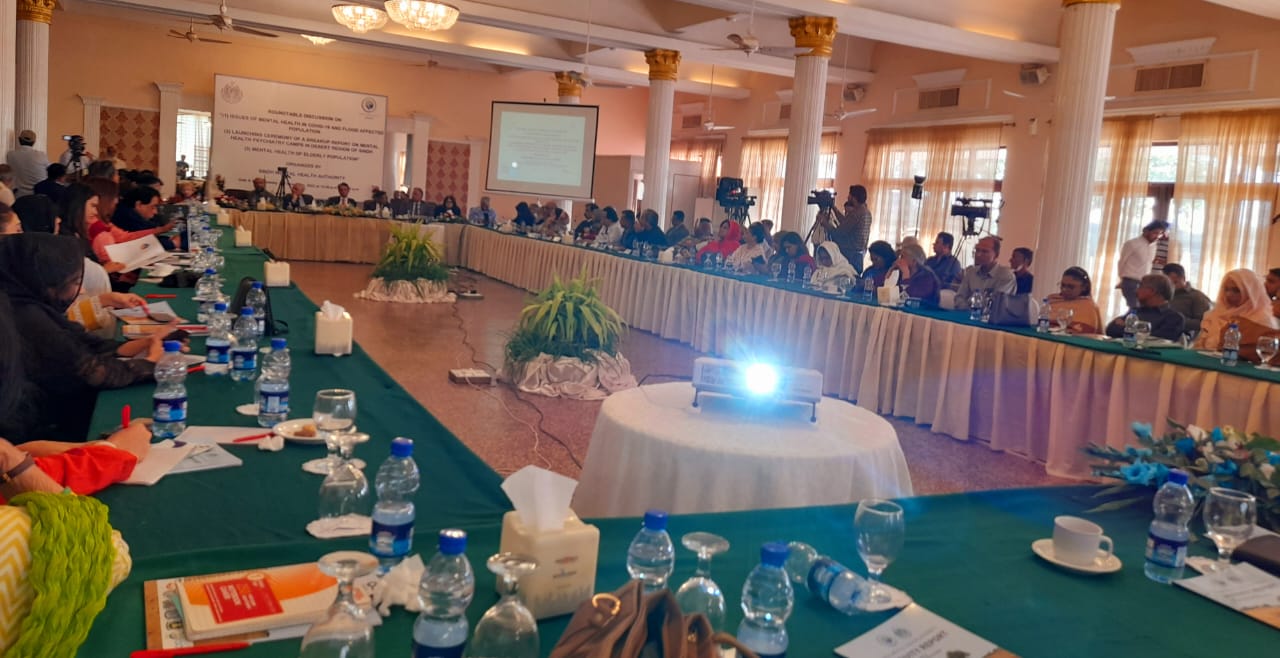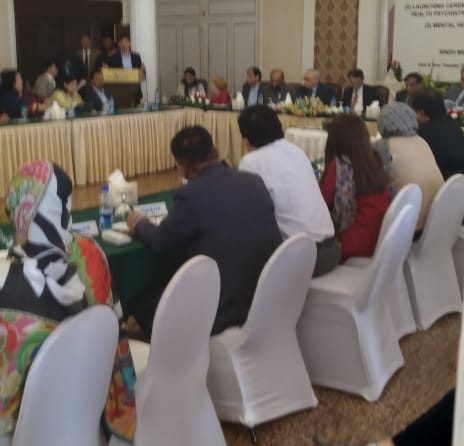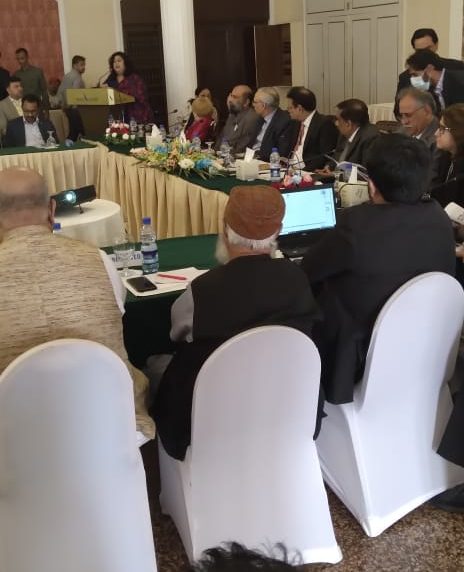
Sindh Chief Secretary assures taking concrete measures to pave the way for establishing Mental Health University in the province
A roundtable discussion and launching ceremony of a ‘Breakup Report on Mental Health Psychiatry Camps in Desert Region of Sindh and Mental Health of Elderly Population’ held by Sindh Mental Health Authority reviews the situation.
Sindh Courier
Karachi
Some 40 percent increase in the mental health issues has been assessed due to Covid-19 and flood situations besides financial damages in Sindh in general and Tharparkar district in particular.
This transpired at a roundtable discussion and launching ceremony of a ‘Breakup Report on Mental Health Psychiatry Camps in Desert Region of Sindh and Mental Health of Elderly Population’ held by Sindh Mental Health Authority (SMHA) at a local hotel in Karachi on Tuesday.
Sindh Mental Health Authority, which had organized the camps in desert region, decided to conduct such more camps in flood affected areas in Sindh.
 The participants of roundtable discussion, after a thorough analysis of the situation, suggested several interventions ranging from public awareness, high quality treatment and rehab services to conducting training programs for health workers and establishment of detoxification units, especially in Tharparkar district where recent studies and surveys indicated an alarming frequency of depression, suicide and substance abuse.
The participants of roundtable discussion, after a thorough analysis of the situation, suggested several interventions ranging from public awareness, high quality treatment and rehab services to conducting training programs for health workers and establishment of detoxification units, especially in Tharparkar district where recent studies and surveys indicated an alarming frequency of depression, suicide and substance abuse.
The conference also urged implementation of Sir Cowasji Jahangir Institute Act and convening the Board of Governors meeting of Sir Cowasji Jahangir Institute of Psychiatry and Behavioral Sciences, Hyderabad. At the earliest.
Sindh Chief Secretary Muhammad Suhail Rajput, who attended the event, in his speech, assured early implementation of the Act, for which he would move the matter to concerned authorities. “I am sure, such measures will pave the way for establishing the Mental Health University in the province, which would be first ever not only in Sindh but entire country,” Rajput said.
Chief Secretary Dr. Suhail Rajput said that being a doctor his first posting was at Cowasji Institute, and therefore he realizes the importance of mental health issues, and added that certain specific measures would be taken to further empower Sindh Mental Health Authority.
 Sindh Mental Health Authority has trained doctors and lady health workers in seven districts for coping mental health issues, however it was further decided that SMHA will impart training to doctors and paramedics in more districts of Sindh.
Sindh Mental Health Authority has trained doctors and lady health workers in seven districts for coping mental health issues, however it was further decided that SMHA will impart training to doctors and paramedics in more districts of Sindh.
The roundtable conference discussed the issues of mental health in covid-19 and flood affected population and mental health of elderly population, as highlighted in breakup report on mental health psychiatry camps in desert region of Sindh.
At the outset, Senator Dr. Karim Ahmed Khawaja, Chairman SMHA welcomed the participants and briefed on the efforts of the organization.
Sharing his experience of the recent Diplo psychiatry camps, Dr. Syed Amir Dabir, the medical superintendent of Sir Cowasji Jahangir Institute of Psychiatry and Behavioral Sciences, said a high number of patients were diagnosed with mental health illnesses, particularly depression.
He told audience: “Out of the 465 patients examined at psychiatry camps held in Diplo, we found 58 per cent suffering from depression, 10pc from anxiety disorder, 15pc psychosis, and three per cents epilepsy and learning disability each,” adding: “Whereas the team diagnosed 46pc patients with epilepsy, 14pc with mental retardation and 13pc with depression out of the 550 cases examined at the Kaloi taluka headquarter hospital.”
Dr. Dabir emphasized the need for training medical officers and community health and social workers in Tharparkar to ensure early diagnosis and management of mental health illness.
About her observations during the psychiatry camp in Thar, Prof Qudsia Tariq, chairperson of Karachi University’s psychology department, said most of the women suffering from post-traumatic stress disorder, depression, anxiety and irritable bowel syndrome were malnourished and anemic.
“A few women also reported suicidal ideation while men mostly reported constant stress and depressed mood along with high levels of irritability and anger while some also reported suicidal ideas as they felt that they have failed to feed their families,” she said, adding that the majority of children were diagnosed with mental retardation followed by cerebral palsy and epilepsy.
 According to Prof Qudsia Tariq, childhood disorders and intellectual disabilities might be a result of inappropriate gynecological facilities and rampant malnourishment among mothers in Tharparkar.
According to Prof Qudsia Tariq, childhood disorders and intellectual disabilities might be a result of inappropriate gynecological facilities and rampant malnourishment among mothers in Tharparkar.
In her recommendations, she underscored the need for setting up improved gynecological services, helplines and drug detoxification units as well as launching nutrition programs.
Speakers during the course of discussion urged the government to decriminalize suicide so that its exact number could be assessed that would in turn help find reasons behind the desperate act.
“Criminalizing suicide doesn’t prevent people from acting on suicidal thoughts. It simply stops them from reaching out and seeking help in times of acute crisis. Besides, the secrecy over the incident is a major barrier in tackling the issue as concerned family members tend to hide the incident, fearing legal action,” social activist Rizwan Edhi noted.
The government, he pointed out, must first determine the actual number of suicides happening in society in order to find the reasons behind the act and designing interventions.
The roundtable discussion was participated by Dr. Mahesh Kumar Malani, Special Assistant to Prime Minister, Dr. Shereen Mustafa, Secretary, Social Welfare Department, Prof. Amjad Siraj Memon, Vice Chancellor, Jinnah Sindh Medical University (JSMU), Karachi, Prof. Amanat Ali Jalbani, Vice Chancellor, Shaheed Benazir Bhutto University, Shaheed Benazirabad, Justice (R) Shahnawaz Tariq, Ombudsman, Provincial Ombudsman Against Harassment of Women at Workplace, Karachi, Dr. Muhammad Juman Bahoto, Director General, Health Services Sindh, Hyderabad, Dr. Nasrullah Shaikh, Director Health Service, Mirpurkhas, Faisal Edhi, CEO, Edhi Foundation, Karachi, Adv. Riaz Hussain Baloch, Principal, Shaheed Zulfiqar Ali Bhutto Law College, Malir, Dr. Greech, DHO Tharparkar, Prof. Dr. Farukh Ahmed, Mr. Muhammad Nasir Khan, Deputy Inspector General (Prison), Karachi, Dr. Shabnam Karim, Representative of Secretary Health, Meritorious Prof. Dr. Muhammad Iqbal Afridi, Prof. Uzma Ali, Director, Institute of Clinical Psychology (ICP), Karachi, Dr. Syed Ali Wasif, President, Pakistan Associate of Mental Health (PAMH), Prof. Hyder Ali Naqvi, Head of Psychiatry Ward, Civil Hospital, Karachi, Associate Prof. Dr. Chooni Lal, Head of Psychiatry Ward, JPMC, Karachi, Prof. Raza ur Rehman, Syeda Farhana Sarfaraz, In-charge, Social Work Department, University of Karachi, Ms. Sanaa Ahmad, Mental Health Manager Pakistan, British Asian Trust, Prof. Khalida Tanveer, Head of Psychology Department Federal Urdu University, Dr. Amir Dabeer, Medical Superintendent, SCJIPB&BS Hyderabad, Dr. Samina Vertegee, Aga Khan University, Dr. Mehtab Akhtar, Director (Monitoring and Evolution) Sindh Healthcare Commission, Dr. Rubina Kidwai, Member of SMHA, Dr. Ajmal Mughal and others.
_____________________